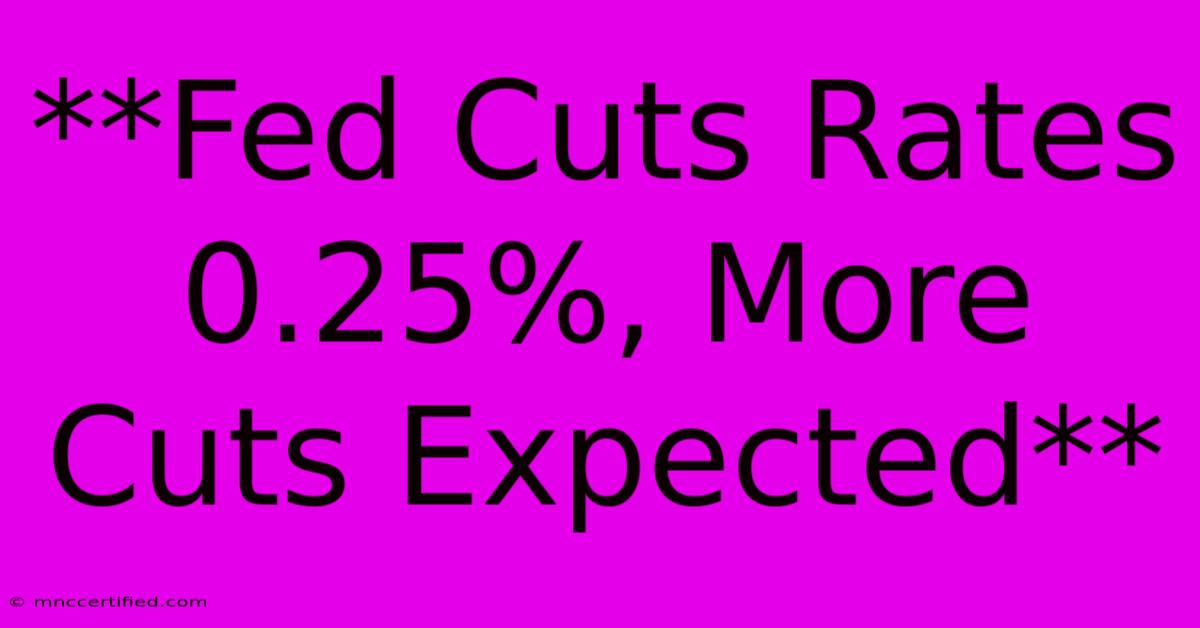**Fed Cuts Rates 0.25%, More Cuts Expected**

Table of Contents
Fed Cuts Rates 0.25%, More Cuts Expected: What This Means for You
The Federal Reserve (Fed) has cut interest rates by 0.25%, a move that has sent ripples through the financial markets. While this is a small reduction, it marks the central bank's first rate cut since 2008 and signals a shift in monetary policy in response to a slowing economy and mounting global uncertainty.
What Does This Mean for Interest Rates?
The Fed Funds Rate, which is the target rate that banks charge each other for overnight loans, now sits at a range of 2.00% to 2.25%. This reduction is intended to stimulate economic growth by making it cheaper for businesses and consumers to borrow money.
Here's how the rate cut might impact you:
- Lower mortgage rates: Homebuyers could see a slight reduction in mortgage rates, potentially leading to more affordable homeownership.
- Cheaper borrowing costs: Businesses may take advantage of lower borrowing costs to expand operations or invest in new projects.
- Potential for inflation: While the rate cut aims to stimulate growth, it could also fuel inflation if it leads to increased borrowing and spending.
Why Did the Fed Cut Rates?
The Fed's decision to cut rates stems from several factors:
- Slowing economic growth: The US economy has slowed in recent months, with weaker consumer spending and manufacturing output.
- Trade tensions: The ongoing trade war with China has added uncertainty to the global economy, impacting businesses and markets.
- Inflation concerns: Although inflation has remained low, the Fed is concerned about potential deflationary pressures in the global economy.
More Rate Cuts on the Horizon?
While the Fed has indicated that this initial rate cut is a "mid-cycle adjustment," analysts expect further reductions in interest rates throughout the year. The Fed will closely monitor economic data and global developments to determine the extent and timing of future cuts.
What Should You Do?
The Fed's decision to cut rates can have both positive and negative implications for individuals and businesses. Here are some things to consider:
- Review your debt: If you have outstanding loans, take advantage of potentially lower interest rates by refinancing or consolidating your debt.
- Re-evaluate your investments: With interest rates declining, consider adjusting your investment portfolio to account for the potential impact on fixed-income securities.
- Stay informed: Monitor economic news and follow the Fed's pronouncements to understand how interest rate changes might affect you.
The Fed's rate cut is a significant development that could have a lasting impact on the economy. By staying informed and taking appropriate action, you can navigate these changing market conditions effectively.
Keywords: Fed, Interest Rates, Rate Cut, Economic Growth, Inflation, Trade War, Monetary Policy, Investment, Debt, Borrowing Costs, Mortgage Rates, Global Uncertainty, Economic Data, Financial Markets

Thank you for visiting our website wich cover about **Fed Cuts Rates 0.25%, More Cuts Expected**. We hope the information provided has been useful to you. Feel free to contact us if you have any questions or need further assistance. See you next time and dont miss to bookmark.
Featured Posts
-
Halle Bailey Criticizes Ddg For Sons Halo On Kai Cenats Stream
Nov 08, 2024
-
Kimmel Chokes Up On Trump Win
Nov 08, 2024
-
Aclu Unveils Plan To Oppose Trump
Nov 08, 2024
-
Bret Denney State Farm Insurance Agent
Nov 08, 2024
-
Deep Tissue Massage Covered By Insurance
Nov 08, 2024